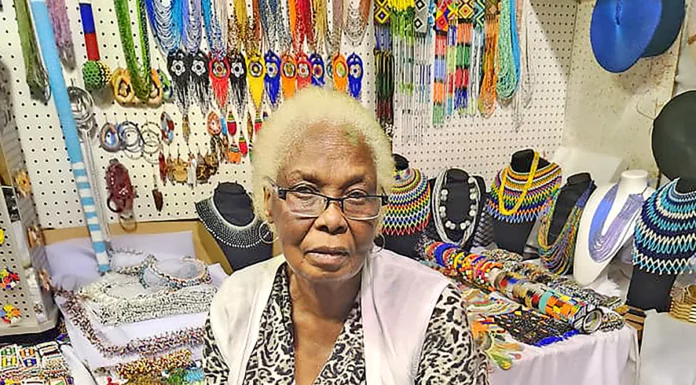African beadwork has undeniably made its mark in the fashion industry.However, the meticulously crafted beadwork is also contributing to making a living for many, while putting food on the table for grandmothers, who in the past typically used the art as their favourite past time.
The Rosebank Art & Craft Market in the north of Joburg, offers a burst of colour, where some of the most inspiring vendors can be found, some could never have imagined making a living out of beadwork.
The vendors have incredible stories to tell of their journeys and how they landed on the two-storey art and craft market. They all speak of a journey fuelled by an unquenchable thirst for making a livelihood from using their crafty hands.
Speaking to Aletta Tshabalala during our visit, she proudly talks about her origin. She hails from Harrismith in the Free State and started beading in 1960, when women of the time used the art to adorn their traditional attire while promoting their culture.
The now 71-year-old Tshabalala says her initial money-spinner was selling food on the streets, but while minding her business she met and made friends with Ndebele women who taught her the art. That was when she realised she could join in and make money out of the Ndebele culture and beadwork-inspired products.
Mama Tshabalala quickly mastered the art that she earned enough to put her children through university.
“I will forever be grateful to the women’s unselfishness as they allowed me to invade their space and learn the Ndebele art.
“I never imagined I would one day sell beadwork and make a living out of it because it had always been seen as backward,” she recalls.
“But the bright colours and the art itself could not be ignored by professional fashion designers who, I think, felt this was a missing piece of the puzzle and started infusing it in their designs to make a fashion statement.”
Tshabalala sells mokorotlo, the traditional Basotho straw hat and all cultural and traditional garbs with bead work.
She says the hats are made in Lesotho and her supplier “does special designs on request”.
“My children are now helping me to keep the business afloat because it helped educate them.
“Traditional clothing and beadwork is making a comeback big time. You just have to be a bit modern, otherwise the business is good, except during the pandemic.
“I was young when I started off, so the idea that beadwork is only for gogos emakhaya [rural area grannies], who typically have nothing to do, is not true. I’ve learnt that people appreciate hand-made artwork and in this space, I learn every day.”
Tshabalala says seeing overseas tourists and locals appreciating their work as they walk around the art and craft market with its colourful and rich treasures daily, was an inspiration for her to sustain the art of original African craft and beading for future generations.
“I am always willing to teach the next generation. Remember, I was also taught.
“I would also appreciate it if we could one day get a person willing to invest in our work and take it overseas as exports because, here, you get it all.”
For the latest entertainment news from Sunday World, click here.
Or read the latest from Shwashwi here.
Follow @SundayWorldZA on Twitter and @sundayworldza on Instagram, or like our Facebook Page, Sunday World, by clicking here for the latest breaking news in South Africa. To Subscribe to Sunday World, click here




